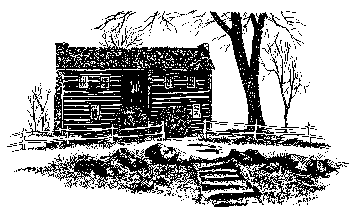Edward Cox (1750-1852) was born in Maryland and converted under the preaching of Francis Asbury in 1773. Soon after, he emigrated west to Virginia and what is now eastern Tennessee.
After two years he returned to Maryland to marry Sallie Meredith, and the day after their wedding they set out for their new home just over the present day border of Virginia, riding horseback some six hundred miles. They probably were the first Methodist settlers in the Holston area.
During the Revolutionary War, Sallie stayed in Tennessee while Edward served as a soldier. Upon his return, Cox, a local preacher, began holding Methodist services in their home. The Cox home was also a welcome resting place for itinerant preachers.
In the late eighteenth century, Tennessee was the wild frontier. The country was rugged and travel was difficult. Preachers had to depend on settlers’ hospitality for food, lodging, and sometimes medical attention. Sallie and Edward Cox, and others like them, played an essential role in the westward growth of the Methodist movement.
Francis Asbury made his first visit to the Cox home in 1788, while on his way to Stephen Keywood’s in Virginia, where he held the first Methodist conference west of the Alleghenies. He stayed with the Cox family at least four other times between 1788 and 1806 on his regular circuits in eastern Tennessee.
Asbury’s journal entries help the present-day reader understand how welcome frontier hospitality was to the circuit rider:
“Saturday, April 1, 1797: The weather was clear and cold: we set off for brother Charles Baker’s. My horse hath the honour of swimming Holston River every time I visit this country.
Sunday, 2: I felt better than I had done since I crossed the mountains. I preached on Acts iii, 26, and was for pushing on again about fifteen miles farther, to Edward Coxe’s [sic]: we got lost, and were an hour in the night.
Monday, 3: We made a stretching ride of about forty miles, and were another hour in the night, and came to Michael Halfacre’s. I was properly outdone, and my fever returned and held me thirty hours.”
Edward Cox lived in his home until the day of his death in 1852 at the age of 102. In 1966, the Holston Conference purchased the Cox House from private owners and has restored and furnished the house to reflect its early nineteenth century history.
Points of interest at this Heritage Landmark: The two story log home has been restored by the Holston Annual Conference to its original dog-trot design with a stairway to the upper room.
Special events: Annual celebration contact Mark Miller or Jane Riley (see contact info below).
Area attractions: Acuff Chapel is twelve miles away, and the Keywood Marker is also nearby. The towns of Bristol, Kingsport, and Johnson City are all close to Bluff City, which is just west of the Holston, Iron, and Appalachian Mountains.
To visit: To arrange a tour, contact Jane Riley (see contact info below).
Location: Within the boundaries of the Holston Annual Conference, in Sullivan County, Tennessee. The Edward Cox House is just off U.S. 11E, one mile northeast of Bluff City.
Food and lodging: Restaurants and motels are available in Bristol, Johnson City, and Kingsport.
Directions: From Interstate 81 in Virginia, take exit 3 onto Commonwealth to Volunteer Parkway and U.S. 11E in Tennessee. Go 10 1/2 miles to State Route 37 (Blountville-Bluff City). Go left under the overpass. Proceed just under a mile on Highway 19 and 34 to Sells Road to the left. You will see an “Edward Cox Home” highway marker there, on the left. Go one mile to the Cox House, at left on a slight rise.
For further information, contact: Jane Riley, 109 Spanish Oak Rd., Bristol, TN 37620; 423-383-1547.
To learn more about United Methodist church history in this area:
Holston Annual Conference Archives, Sherman Hall, Tennessee Wesleyan University, 204 E College St., Athens, TN 37303; 423-746-5279; E-mail: rturner@tnwesleyan.edu.
Wilma Dykeman, Tennessee, A Bicentennial History (New York: Norton, 1975).
Isaac P. Martin, Methodism in Holston (Knoxville, TN: Methodist Historical Society of Holston Conference, 1945).

